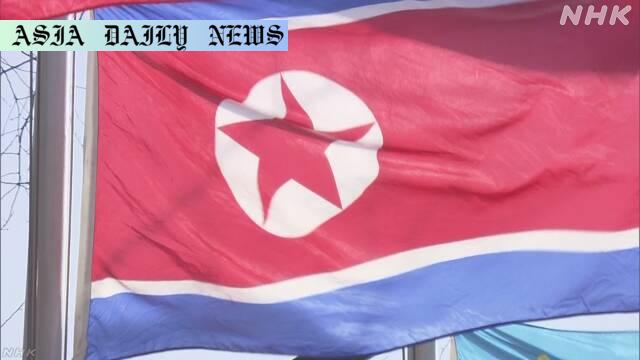military control: Kim Jong Un tightens control after warship accident, signaling efforts to address military oversight challenges.
Kim Jong Un emphasized stronger party control of North Korea’s military.
Meeting follows a warship accident during its launch last week.
Aimed at addressing challenges in military development and operations.
Key appointments made in military leadership remain undisclosed.

North Korea’s Leadership Tightens Grip on the Military
In the wake of a recent accident involving a North Korean warship, the nation’s leader, Kim Jong Un, has called for stronger ruling party control over the military. This move is seen as an effort to address internal challenges and reassert authority within the armed forces. At a recent expanded meeting of the Central Military Commission of the ruling Workers’ Party, Kim emphasized the need for the party to play a more active role within military organizations to tackle various challenges related to military operations and development. His call for action comes amid increasing domestic and international scrutiny of North Korea’s military capabilities and leadership structure.
A Response Triggered by Crisis
The recent warship accident has brought significant attention to the efficiency and effectiveness of North Korea’s military oversight. While the specifics of the incident remain undisclosed, it reportedly occurred during the launch of a warship, raising questions about the operational readiness of the country’s naval forces. This incident appears to have acted as a catalyst for the meeting, where Kim and senior officials discussed measures to solidify party influence and solve systemic military issues. One of the key highlights of the meeting was the announcement of new military appointments, the details of which have been kept confidential. Such decisions point to Kim’s determination to prevent future lapses and ensure loyalty within the ranks of the military.
Party Control versus Military Autonomy
Observers have noted that Kim’s approach to tightening party control over the military reflects a growing focus on consolidating internal power. This strategy is significant given the context of North Korea’s political and military stance, where any sign of weakness could have broader implications for domestic stability and international relations. The demotion of Jong Kyong Thaek, the head of the General Political Bureau of the Korean People’s Army, is a telling example of this power shuffle. Jong was responsible for ideological education and ensuring allegiance to the Workers’ Party within the military, making his demotion a noteworthy development within North Korea’s leadership landscape.
Geopolitical Implications
North Korea’s military and political dynamics remain a subject of global concern, particularly for neighboring South Korea and its allies. The measures taken by Kim in response to the recent warship accident highlight an attempt to project strength and control domestically while presenting a unified front to the international community. Such moves come at a time when regional tensions are already high, with North Korea continuing its weapons development programs and facing criticism over human rights issues and economic challenges. The decisions made in these military leadership meetings will likely have long-term implications for the stability and strategy of North Korea’s armed forces.
Conclusion
Kim Jong Un’s push for stronger party control over the military underscores a critical moment in North Korea’s governance and military strategy. The warship incident serves as a reminder of the challenges the regime faces in maintaining its image of strength and coordination. As new appointments and policies are implemented, it remains to be seen how these changes will affect the overall structure and functionality of North Korea’s military. Meanwhile, the world watches closely, aware of the broader implications of these internal shifts in one of the most secretive nations on the planet.
Commentary
Kim Jong Un’s Leadership in Crisis
Kim Jong Un’s recent decision to enforce tighter party control over the military reflects his approach to leadership amidst crisis. The warship accident, though seemingly a singular event, is indicative of the broader challenges within North Korea’s armed forces. By calling for an expanded meeting of the Central Military Commission, Kim has made a deliberate effort to project an image of decisiveness and accountability. This move seems designed not only to address the immediate aftermath of the accident but also to reinforce the loyalty and effectiveness of the military under party supervision.
A Shift in Leadership Dynamics
The reported demotion of high-ranking officials such as Jong Kyong Thaek underscores a significant shift in leadership dynamics within North Korea. Jong’s role in ideological education was central to maintaining alignment with the party’s goals, making his demotion a powerful signal that Kim is prioritizing operational efficiency and discipline over traditional roles. This adjustment likely reflects Kim’s perspective that maintaining control in both doctrine and action is crucial to preserving the stability of his regime. Such leadership shifts may signify the potential for continued restructuring in areas where performance is faltering or loyalty is questioned.
Implications for the International Community
For the international community, Kim’s actions highlight the complex interplay between internal governance and external strategy in North Korea. While the incident leading to these changes may appear minor, it represents a larger pattern of adaptability in North Korean leadership when faced with challenges. This adaptability, however, is often paired with an unyielding stance toward external criticism and pressure. Regional powers and global entities must consider these recent developments as part of a broader context of North Korea’s military readiness and political adaptability.
Conclusion
In conclusion, Kim Jong Un’s actions serve as a reminder of the delicate balance of power and control within authoritarian regimes. The decision to strengthen party oversight of the military following a high-profile incident reflects not only the complexities of military management but also the intense focus on maintaining authority. As these changes unfold, they provide a window into the strategic priorities of a regime that remains both enigmatic and consequential on the world stage.


